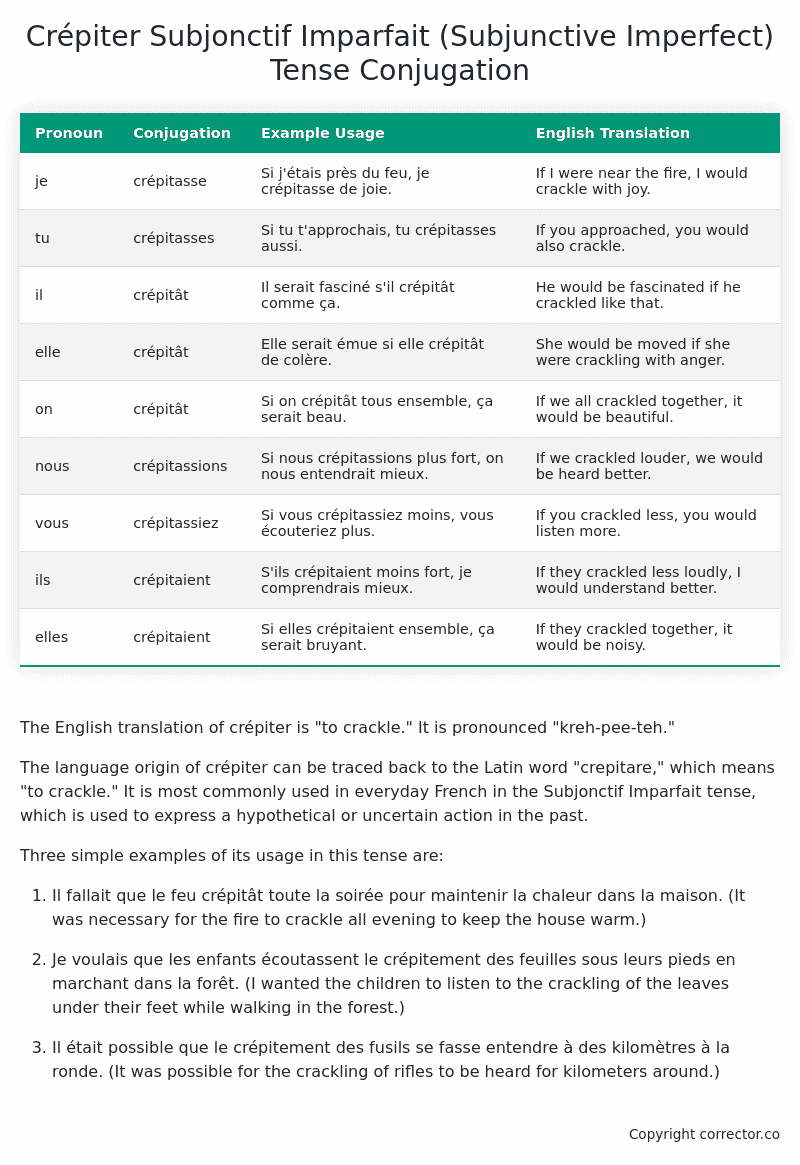Subjonctif Imparfait (Subjunctive Imperfect) Tense Conjugation of the French Verb crépiter
Introduction to the verb crépiter
The English translation of crépiter is “to crackle.” It is pronounced “kreh-pee-teh.”
The language origin of crépiter can be traced back to the Latin word “crepitare,” which means “to crackle.” It is most commonly used in everyday French in the Subjonctif Imparfait tense, which is used to express a hypothetical or uncertain action in the past.
Three simple examples of its usage in this tense are:
-
Il fallait que le feu crépitât toute la soirée pour maintenir la chaleur dans la maison. (It was necessary for the fire to crackle all evening to keep the house warm.)
-
Je voulais que les enfants écoutassent le crépitement des feuilles sous leurs pieds en marchant dans la forêt. (I wanted the children to listen to the crackling of the leaves under their feet while walking in the forest.)
-
Il était possible que le crépitement des fusils se fasse entendre à des kilomètres à la ronde. (It was possible for the crackling of rifles to be heard for kilometers around.)
Table of the Subjonctif Imparfait (Subjunctive Imperfect) Tense Conjugation of crépiter
| Pronoun | Conjugation | Example Usage | English Translation |
|---|---|---|---|
| je | crépitasse | Si j’étais près du feu, je crépitasse de joie. | If I were near the fire, I would crackle with joy. |
| tu | crépitasses | Si tu t’approchais, tu crépitasses aussi. | If you approached, you would also crackle. |
| il | crépitât | Il serait fasciné s’il crépitât comme ça. | He would be fascinated if he crackled like that. |
| elle | crépitât | Elle serait émue si elle crépitât de colère. | She would be moved if she were crackling with anger. |
| on | crépitât | Si on crépitât tous ensemble, ça serait beau. | If we all crackled together, it would be beautiful. |
| nous | crépitassions | Si nous crépitassions plus fort, on nous entendrait mieux. | If we crackled louder, we would be heard better. |
| vous | crépitassiez | Si vous crépitassiez moins, vous écouteriez plus. | If you crackled less, you would listen more. |
| ils | crépitaient | S’ils crépitaient moins fort, je comprendrais mieux. | If they crackled less loudly, I would understand better. |
| elles | crépitaient | Si elles crépitaient ensemble, ça serait bruyant. | If they crackled together, it would be noisy. |
Other Conjugations for Crépiter.
Le Present (Present Tense) Conjugation of the French Verb crépiter
Imparfait (Imperfect) Tense Conjugation of the French Verb crépiter
Passé Simple (Simple Past) Tense Conjugation of the French Verb crépiter
Passé Composé (Present Perfect) Tense Conjugation of the French Verb crépiter
Futur Simple (Simple Future) Tense Conjugation of the French Verb crépiter
Futur Proche (Near Future) Tense Conjugation of the French Verb crépiter
Plus-que-parfait (Pluperfect) Tense Conjugation of the French Verb crépiter
Passé Antérieur (Past Anterior) Tense Conjugation of the French Verb crépiter
Futur Antérieur (Future Anterior) Tense Conjugation of the French Verb crépiter
Subjonctif Présent (Subjunctive Present) Tense Conjugation of the French Verb crépiter
Subjonctif Passé (Subjunctive Past) Tense Conjugation of the French Verb crépiter
Subjonctif Imparfait (Subjunctive Imperfect) Tense Conjugation of the French Verb crépiter (this article)
Subjonctif Plus-que-parfait (Subjunctive Pluperfect) Tense Conjugation of the French Verb crépiter
Conditionnel Présent (Conditional Present) Tense Conjugation of the French Verb crépiter
Conditionnel Passé (Conditional Past) Tense Conjugation of the French Verb crépiter
L’impératif Présent (Imperative Present) Tense Conjugation of the French Verb crépiter
L’infinitif Présent (Infinitive Present) Tense Conjugation of the French Verb crépiter
Struggling with French verbs or the language in general? Why not use our free French Grammar Checker – no registration required!
Get a FREE Download Study Sheet of this Conjugation 🔥
Simply right click the image below, click “save image” and get your free reference for the crépiter Subjonctif Imparfait tense conjugation!

Crépiter – About the French Subjonctif Imparfait (Subjunctive Imperfect) Tense
Formation
Common Everyday Usage Patterns
Interactions with Other Tenses
Subjonctif Présent
Indicatif Passé Composé
Conditional
Conditional Perfect
Summary
I hope you enjoyed this article on the verb crépiter. Still in a learning mood? Check out another TOTALLY random French verb conjugation!


